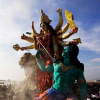Concerns over Durga Puja security must be put to bed

As Durga Puja, the most important religious festival for Bengali-Hindus, approaches, ensuring a peaceful environment for celebrations is more urgent than ever. This year's festival comes against a backdrop of heightened tension surrounding attacks on minorities in the wake of the ouster of Sheikh Hasina. It is also the first to be held under the interim government and a reconfigured but still-struggling police force, making it a litmus test for how well security can be maintained by them. That being the case, we are worried to see some troubling signs of disturbance that—if allowed to recur—would dampen the celebratory mood, to say the least.
In Pabna's Sujanagar upazila, for example, unidentified vandals destroyed nine idols in two separate attacks on Saturday and Tuesday nights. Later, in Kishoreganj early on Thursday, seven idols were vandalised at a Puja mandap. These attacks, happening so close to the start of Durga Puja on October 9, have left local Hindu communities with renewed fear and anxiety. The incidents also show how fragile the situation can be in certain parts of the country which calls for heightened vigilance from all stakeholders, including local authorities, community leaders, and volunteers.
The measures taken by the authorities so far seem to be on the right track. The home ministry has issued a set of guidelines instructing law enforcement agencies to increase patrols and monitoring. Additionally, Puja organising committees have been asked to employ a rotating system of volunteers to guard the mandaps, and install CCTV cameras for round-the-clock surveillance. For such security measures to be effective, however, there is no alternative to collaborative efforts, involving a whole-of-society approach much like what we witnessed after August 5 when students and community members came forward to guard temples and minority establishments. This cooperative spirit must continue.
Moreover, central to the success of security measures and collaborations is addressing the gap between official directives and their implementation on the ground. While the authorities may outline robust security plans, lapses in execution can, and often did, undermine efforts. The sincerity of officers in carrying out these plans is crucial. Another concern is the spread of misinformation and inflammatory content on social media which have led to communal attacks in the past. It is, therefore, essential that the authorities closely monitor these platforms and bring to justice anyone trying to inflame tensions.
Ideally, Bangladesh's long-held tradition of communal harmony should not require an overwhelming security apparatus to uphold, but given recent experience, this has become paramount. That said, our ultimate goal should be to foster an environment where the festivals of all minority communities can be held without fear, where diversity of any kind is respected and protected. We must work towards building a more inclusive and tolerant society.

 For all latest news, follow The Daily Star's Google News channel.
For all latest news, follow The Daily Star's Google News channel. 








Comments